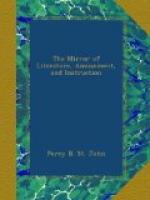ARCHITECTUS.
* * * * *
LIVING AUTHORS.
No. 1.
* * * * *
Bernard Barton.
“Sheltered, but not to social duties
lost;
Secluded, but not buried; and with song
Cheering his days.”
The productions of Mr. Barton are doubtless familiar to most of our readers, and from them they have learnt much of the amiable turn of the poet’s character. Mr. Barton’s compositions afford indications of genuine feeling, of deep affection, of benevolence, sympathy, taste, and integrity; he seems to have an ear ever on the listen for the accents of charity, patriotism, and religion; where human anguish causes the tear to start, there he would fain be to soothe and alleviate. Such is the character of the poet, and in the following sketch such will be proved to be the character of the man.
Bernard Barton was born in the vicinity of London, on the 31st of January, 1784. His father was in trade in the metropolis, whither he had come from his native place, Carlisle. Bernard had the misfortune to lose his mother one month after his birth: her maiden name was Mary Done, and she was a native of Rockcliffe, Cumberland; she died at the early age of thirty-two. The following lines To a Profile evince the feelings with which our poet still cherishes her memory, or rather the recollection of what has been told him respecting her:—
“I knew thee not! then wherefore
gaze
Upon thy silent shadow there,
Which so imperfectly portrays
The form thy features used
to wear?
Yet have I often looked at thee,
As if those lips could speak to me.
I knew thee not! and thou couldst know,
At best, but little more of
one
Whose pilgrimage on earth below
Commenced, just ere thy own
was done;
For few and fleeting days were thine,
To hope or fear for lot of mine.




